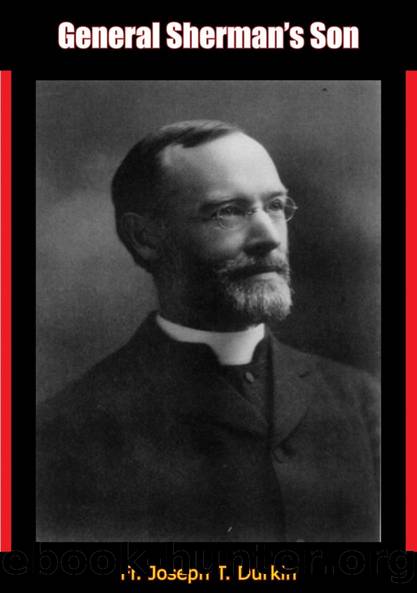General Sherman's Son by Fr. Joseph T. Durkin

Author:Fr. Joseph T. Durkin [Durkin, Fr. Joseph T.]
Language: eng
Format: epub
ISBN: 9781258865498
Google: TertnQEACAAJ
Publisher: Literary Licensing, LLC
Published: 2013-10-15T15:54:58+00:00
CHAPTER 10âThe Chicago Music Hall Address
PERHAPS HIS GREATEST address during this first period of his public achievement was that given in the vast Central Music Hall at Chicago on February 4, 1894. He had come up from St. Louis to talk on a topic specially chosen by himselfââThe Jesuit, Fact and Fiction.â The Order, at the time, was under vicious and unfair attack from many quarters. It was high time, he felt, to reveal to the American people the true character of the Society of Jesus. Apart from its intrinsic value, the address is highly significant in view of his later career as a Jesuit.
A few hours before he spoke he was interviewed by the press on some general topics. He expressed to the newsmen his ideas on religion and politics. He was proud of the progress of the Catholic Church in this country. In Chicago there were a hundred Catholic parishes; fifty years before, there had been none. Political conditions in the United States, he believed, were the best possible for the growth of the Church. Complete separation of church and state was the most fruitful means of nourishing religion. A manâs religious tenets should not be considered when he enters politics. As long as he is an honest politician, what difference does it make whether he be a Catholic, a Methodist, or a Baptist?
Broadening the scope of his remarks, he said he had a supreme faith in America. And he loved the American individualââThere is something in his character which we cannot find in any other nationality.â
When asked whether he thought Cardinal Gibbons might be elected Pope, he answered with rather unusual frankness. It must be remembered, he reminded his questioners, that the Catholic Church is âthe greatest factor in the world in influencing nations.â Therefore it would be better to have as Supreme Pontiff a European, who would be more adept at dealing with the Great Powers of the Continent.{327}
On the following evening he addressed a multitude that packed to the doors the great Central Music Hall in downtown Chicago. It was by no means a dominantly Catholic audience. It represented a cross-section of the thinking people of the metropolis and included some of the most outstanding leaders in civic affairs. Tom Sherman enjoyed that night a superb opportunity to present his message to the most influential minds in Chicago. Probably no public lecture by a clergyman up to that time had received the wide attention as this one was destined to evoke.
His modestly confident manner, as he advanced to the rostrum to begin, showed no effects of an unpleasant incident that had occurred as he left St. Louis. His rector, Father Rudolph Meyer, contrary to what seems to have been his generally forbearing attitude, had administered to him a rudely sharp warning against pride. The remark had hurt, though Tom had been able temporarily to forget it.{328}
His appearance on the stage and his general style was variously described by the newspapers next morning. He was a âyoung man of spare, wiry, upright form.
Download
This site does not store any files on its server. We only index and link to content provided by other sites. Please contact the content providers to delete copyright contents if any and email us, we'll remove relevant links or contents immediately.
| United States | Abolition |
| Campaigns & Battlefields | Confederacy |
| Naval Operations | Regimental Histories |
| Women |
In Cold Blood by Truman Capote(3374)
The Innovators: How a Group of Hackers, Geniuses, and Geeks Created the Digital Revolution by Walter Isaacson(3145)
Steve Jobs by Walter Isaacson(2889)
All the President's Men by Carl Bernstein & Bob Woodward(2363)
Lonely Planet New York City by Lonely Planet(2217)
And the Band Played On by Randy Shilts(2197)
The Room Where It Happened by John Bolton;(2150)
The Poisoner's Handbook by Deborah Blum(2135)
The Innovators by Walter Isaacson(2098)
The Murder of Marilyn Monroe by Jay Margolis(2094)
Lincoln by David Herbert Donald(1982)
A Colony in a Nation by Chris Hayes(1927)
Being George Washington by Beck Glenn(1911)
Under the Banner of Heaven: A Story of Violent Faith by Jon Krakauer(1788)
Amelia Earhart by Doris L. Rich(1687)
The Unsettlers by Mark Sundeen(1682)
Dirt by Bill Buford(1670)
Birdmen by Lawrence Goldstone(1662)
Zeitoun by Dave Eggers(1643)
